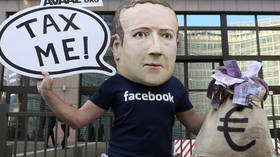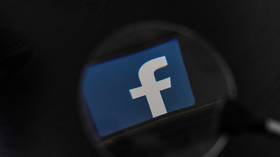'Largest scam in history': HALF of Facebook accounts fake, says Zuckerberg's Harvard classmate

As many as half of Facebook's two billion accounts are fake or duplicates, according to a new report from a former classmate of CEO Mark Zuckerberg. He has highlighted how the fakes defraud users, advertisers and investors alike.
Rocked by a major privacy scandal last year, Facebook has been trying to create an image of a company with high community standards, striving to curb the illicit behavior of users. But the company may be deliberately understating the amount of fake accounts, a new report says.
The firm's own quarterly investment reports reveal that its much-vaunted account base, which is supposedly has over 2 billion monthly active users, is packed with fake accounts communicating with just enough randomness to trick the social network's algorithms, according to Zuckerberg's former classmate at Harvard, Aaron Greenspan.
Also on rt.com Not journalism but propaganda: Fact-checkers turn on Facebook for spreading its own fake newsGreenspan claimed that he had originally come up with the idea for Facebook and worked on the future network, before Zuckerberg eventually founded the company. That claim was the basis of the trademark dispute between Facebook and Greenspan's company, Think Computer Corporation, settled in 2009.
In a report, published by his legal data nonprofit PlainSite, Greenspan alleges that Facebook "has been lying to the public about the scale of its problem with fake accounts, which likely exceed 50 percent of its network."
The fake accounts are particularly dangerous because they "often defraud other users on Facebook, through scams, fake news, extortion, and other forms of deception" and often "involve governments," he writes.
He further accused the company of "selling" ads to "hundreds of millions of phantom buyers – users who do not actually exist."
Mark let so many people cheat, for so long, across so many time zones, that he may have (at first) inadvertently created the largest scam in history.
According to Greenspan, Facebook has attempted to obscure and downplay the actual number of fake accounts and their prevalence by employing "cleverly worded disclaimers" in its official reporting as well as dropping "many" of the important metrics from quarterly reports altogether.
In his report, citing the social network's own estimates, Greenspan concludes that since the end of 2017 Facebook has deleted at least 2.8 billion fake accounts, which is more that the amount of its monthly active users and more than a half of "all accounts ever created."
Facebook outright denied Greenspan's claims. "This report is completely wrong and not based on any facts or research," the company told RT, adding that Facebook files its fake account estimates with the Securities and Exchange Commission every quarter. “This is unequivocally wrong and responsible reporting means reporting facts, even if it’s about fake accounts," the statement continued.
Still, an entire industry has sprung up to supply convincingly "aged" fake Facebook accounts, often bundled by the hundred and boasting less than 1 percent detection rate.
Facebook attracts advertisers by flaunting the access to its billion-plus users, sorted and categorized by a marketer's dream of individual data. However, some reports claim that in reality a sizeable amount of traffic online is generated by 'fake-clicking' done by bots and humans working on specially-organized 'click farms,' as the company reached the market saturation or simply 'ran out of humans.'
Also on rt.com Facebook is sued for ‘inflating’ ad watch times by up to 900% to lure in advertisersSmall advertisers sued the social media giant last year, claiming it overstated the amount of time users spent watching videos by up to 900 percent. According to Marketing Land, the alleged fraud is far from an isolated event: Facebook misreported the reach of Facebook Page posts, the proportion of users who watch ad videos all the way through, the average time users spend reading "instant articles," the number of referrals to external websites, and the number of mobile views, as claimed in the reports the outlet collected.
Facebook's role in global ads is expected to grow. Digital publishing agency Polar estimated that the tech giant, together with Google and several other 'digital goliaths' like Amazon, will control 80 percent of all digital advertising in 2019.
In recent years, the social network had been entrenched in high-profile controversies over users' data protection, privacy issues, and the spread of misinformation online. To make matters worse, Facebook's market value has been sliding downwards since July, when it lost almost $120 billion in a single day of trading – the largest-ever drop in company valuation in stock market history.
Following the Cambridge Analytica data-mining scandal, the company's CEO Mark Zuckerberg admitted that Facebook didn't do enough to safeguard its users' interests and apologized. In response to mounting criticism, he vowed to step up commitments to privacy protection.
In an effort to combat disinformation, the company experimented with its algorithms to detect 'fake news' and brought third-party fact-checkers on board for help.
Also on rt.com Facebook may face a record fine over privacy lapses – reportsIn the first six months of 2018 alone Facebook said it removed around 1.5 billion fake accounts. Last year, the company also reported removing fake accounts linked to either Russia or Iran, and although the numbers were minute on the overall scale, measuring from under 100 to several hundred, the news received wide coverage.
Facebook's model of operations "can feel opaque" and be hard to understand for outsiders, Mark Zuckerberg wrote in an op-ed for Wall Street Journal on Thursday.
Sometimes this means people assume we do things that we don't do. For example, we don't sell people's data, even though it's often reported that we do.
The company's CEO reiterated that the network has "strong incentive" to protect users' data and selling off such information is against the company's business interests.
Think your friends would be interested? Share this story!













